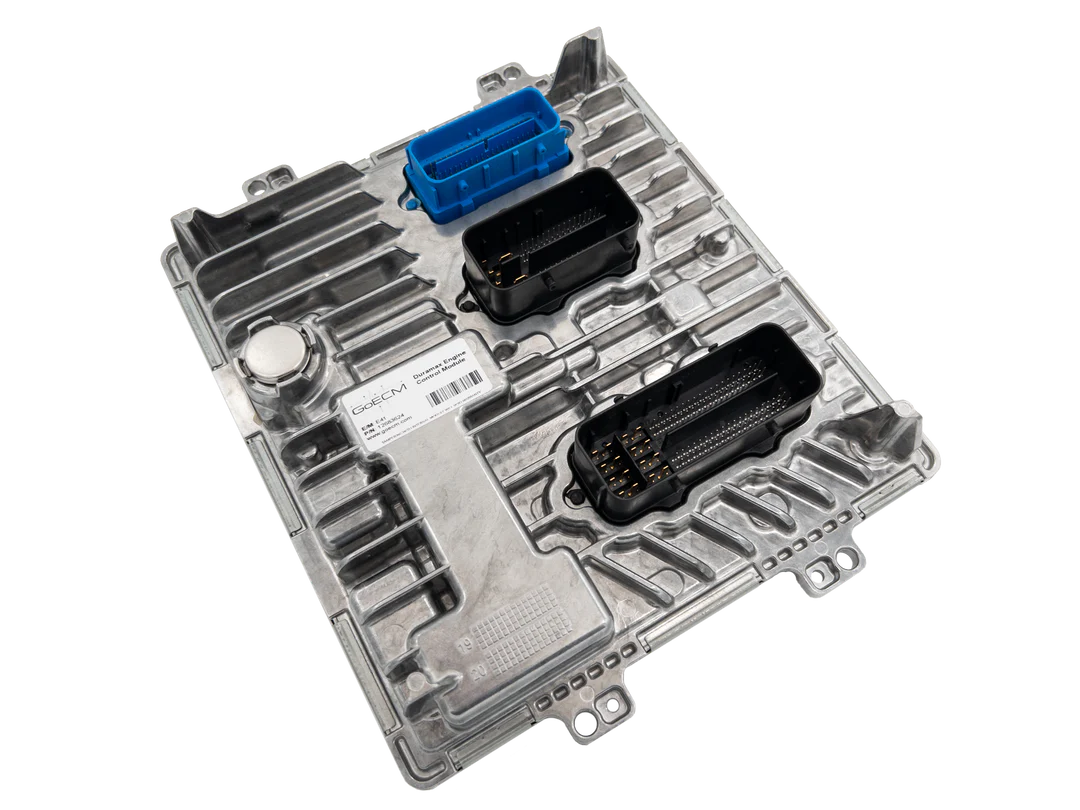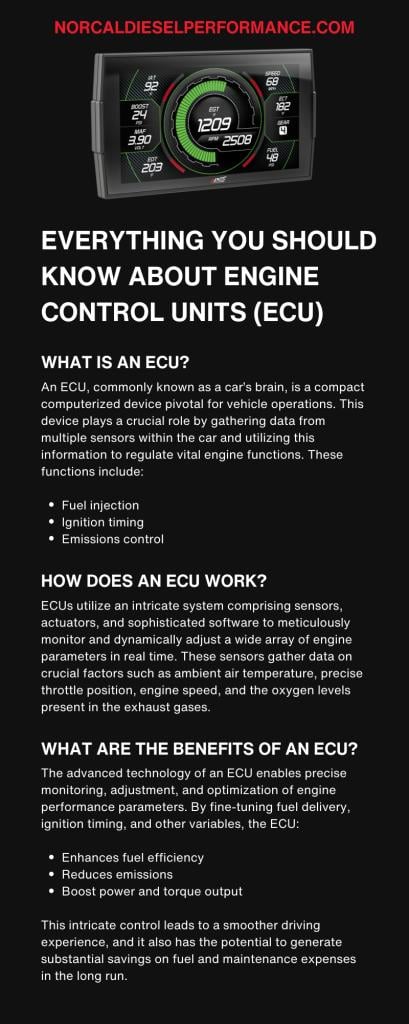


Engine control units (ECUs) are important parts of your vehicle, but what exactly are they? What specific role do ECUs play in your truck? Whether you’re a passionate enthusiast or a skilled mechanic, it’s important to dive into your vehicle’s intricacies and learn everything there is to know about engine control units (ECUs). These vehicle fixtures have a vital role in the modern automotive industry, and you must understand all about this crucial component of your vehicle’s engine.
An ECU, commonly known as a car’s brain, is a compact computerized device pivotal for vehicle operations. This device plays a crucial role by gathering data from multiple sensors within the car and utilizing this information to regulate vital engine functions. These functions include:
These components work in harmony to ensure optimal engine performance and efficiency, and the ECU helps make that happen. Just like a conductor skillfully coordinates an orchestra, the ECU fine-tunes and synchronizes the components of the engine, transmission, and other systems to ensure efficient operation. Through its precise adjustments and monitoring, the ECU optimizes performance, fuel efficiency, and overall functionality.
ECUs utilize an intricate system comprising sensors, actuators, and sophisticated software to meticulously monitor and dynamically adjust a wide array of engine parameters in real time. These sensors gather data on crucial factors such as ambient air temperature, precise throttle position, engine speed, and the oxygen levels present in the exhaust gases.
After collecting the data, the ECU can interpret it and then signal to actuators in the engine to make necessary adjustments. These adjustments help everything work so that you can enjoy the performance and efficiency of your truck and engine.
The advanced technology of an ECU enables precise monitoring, adjustment, and optimization of engine performance parameters. By fine-tuning fuel delivery, ignition timing, and other variables, the ECU:
This intricate control leads to a smoother driving experience, and it also has the potential to generate substantial savings on fuel and maintenance expenses in the long run.
There are two primary types of ECUS you can see in vehicles—OEM ECUs and aftermarket versions. These factory OEM ECUs are a part of the vehicle when it goes out on the market, the manufacturer’s version of a baseline control system. On the other hand, aftermarket ECUs are standalone units that you can purchase separately and install yourself to customize your vehicle’s performance.
These aftermarket ECUs offer enhanced flexibility and a wide range of customization options, allowing for more precise tuning to get more performance out of your engine. Many truck enthusiasts opt for aftermarket ECUs so that they can enhance their truck’s performance.
A malfunctioning ECU can lead to a range of issues in your vehicle. These may include decreased fuel efficiency, erratic idling, or challenges when starting the engine. If you observe these symptoms, it’s time to seek an experienced professional’s assistance. With their expertise, you can spot and address issues earlier, preventing further ECU complications down the line.
While the ECU is an important part of your truck, there are still many misconceptions that pervade automotive circles. A big misconception is that ECUs are easy to hack. In reality, modern ECUs come with advanced security features that make hacking almost impossible. ECUs are also not as expensive to replace as some may think. In many instances, repairing or reprogramming a malfunctioning ECU can save lots of money as opposed to a complete ECU replacement.
You cannot overlook maintenance if you want to guarantee the longevity and top-notch performance of your ECU. When you follow your manufacturer’s maintenance schedule, including tune-ups and fuel system cleaning, you can keep your truck and ECU working properly. Software updates are also an important part of maintenance you cannot neglect.
If you’re contemplating the possibility of upgrading to an aftermarket ECU for your vehicle, you need to make a few initial considerations. Before making any purchasing decisions, you must conduct research on the different brands and consumer feedback to find the best ECU for your wallet and truck. The make and model of your truck and engine need to be compatible with any ECU you get, so keep that in mind as you search.
Additionally, it’s best to find an ECU that comes with some level of customization. If you have specific performance goals, you need to find the aftermarket ECU that helps you reach those goals. Then, after finding the right ECU, consider working with professionals for installation so that you can rest easy knowing the ECU functions well. Poor installation could lead to preventable damage down the line.
While an ECU is an amazing part of your vehicle, it’s not always going to perform as well as it was the day you first got behind the wheel. There are various factors that can impact the performance of your ECU, including various environmental conditions. Extreme temperatures play a significant role. High heat can lead electronic components to overheat and eventually break down, while extreme cold temperatures can cause malfunctions.
Additionally, water damage is another problem that can happen. The ECU is close to the engine bay, so it is incredibly vulnerable to water or other liquids seeping in. Additionally, wear and tear are inevitable over time. Electronic components can deteriorate, leading to issues that you could have avoided with proper maintenance.
ECUs are a kind of automotive technology that’s made big waves since electronics became a big part of the automotive industry, and it’s not done yet. ECUs are going to have a bigger role going forward into the future as more electric and hybrid vehicles emerge on the market. These ECUs have evolved a lot, and beyond just managing battery power and motor control, they may play an even bigger role in enhancing performance and optimizing energy efficiency later.
Furthermore, artificial intelligence and machine learning may further revolutionize ECUs going forward. These advancements may pave the way for more sophisticated algorithms that can adapt in real-time, leading to enhanced operational efficiency and reduced environmental impact.
With a deeper insight into everything that you should know about engine control units (ECUs), you can better understand the important role they play in boosting your truck’s performance. There are things you can do to improve these vital components, but to perform these ECU upgrades, you need the right parts from people like Norcal Diesel Performance. Whether you need a 2007-2018 diesel programmer for Cummins or a tuner for any other diesel engine, our experts and wide selection of parts have you covered!

You must login to post comments.